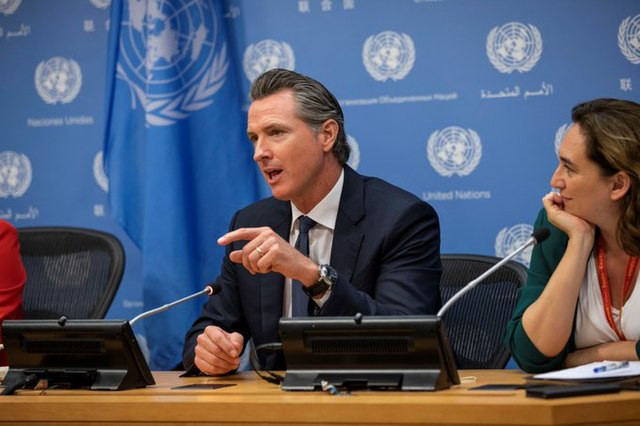California Governor Gavin Newsom has thrown his support behind efforts to restrict smartphone use in the state's schools, citing the adverse mental health impacts of social media on students. Newsom's backing comes in the wake of U.S. Surgeon General Vivek Murthy's renewed warnings about the detrimental effects of social media on adolescent mental health.
In a statement on Tuesday, Newsom expressed his intent to collaborate with the state legislature to implement restrictions on smartphone use during the school day. "As the Surgeon General affirmed, social media is harming the mental health of our youth. Building on legislation I signed in 2019, I look forward to working with the Legislature to restrict the use of smartphones during the school day," he said. "When children and teens are in school, they should be focused on their studies - not their screens."
Murthy, in an op-ed for The New York Times, called for a surgeon general's warning label to be placed on social media platforms, underscoring the role these platforms play in exacerbating the youth mental health crisis. He advocated for phone-free environments in schools to mitigate these risks.
Newsom's announcement also coincided with the Los Angeles Unified School District Board of Education's decision to ban smartphones in classrooms. The board voted 5-2 on Tuesday to develop a policy prohibiting student use of cellphones and social media platforms, aiming to implement the policy by January 2025. "I think we're going to be on the vanguard here, and students and this entire city and country are going to benefit as a result," said board member Nick Melvoin, who proposed the resolution.
This move places Los Angeles, the second-largest school district in the U.S., at the forefront of a growing national trend to curtail smartphone use in educational settings. Florida Governor Ron DeSantis has already implemented similar measures, and other states like Indiana and Ohio have enacted laws restricting classroom cell phone use.
Newsom's stance on this issue, however, is not entirely new. In 2019, he signed legislation encouraging schools to develop policies around restricting smartphone use. His latest initiative aims to build on that foundation, with specific legislative action anticipated before the end of the current session in August.
The political dynamics of this issue are notable, given that Newsom's archrival, Florida Governor Ron DeSantis, was the first to sign a comprehensive classroom cell phone ban. DeSantis's law, which took effect last year, not only bars students from using cellphones in the classroom but also blocks access to social media through district Wi-Fi and mandates education on the behavioral impacts of social media.
Bryan Griffin, a spokesperson for DeSantis, commented on Newsom's announcement, saying, "Keep copying Florida, California! There may still be a chance to come back from the brink." This rivalry adds an intriguing layer to the discourse, as Newsom is typically critical of Florida's education policies.
Research linking social media use to mental health issues bolsters the rationale for these restrictions. Surgeon General Murthy referenced studies indicating that adolescents who spend more than three hours a day on social media may be at increased risk of mental health problems. A Gallup poll cited by Murthy showed the average teenager spends 4.8 hours per day on social media.
The Los Angeles school district, in its decision, highlighted concerns about cell phone addiction contributing to rising rates of anxiety and cyberbullying among students. The policy development will consider various aspects, including the storage of phones during school hours and accommodations for students with disabilities.
While some board members expressed reservations about the enforceability and restrictiveness of the policy, the overall direction reflects a growing consensus on the need to address the mental health impacts of social media on young people. "I think it's going to be a full-time job being the police of the phone," said board member Scott Schmerelson, who voted against the resolution.




